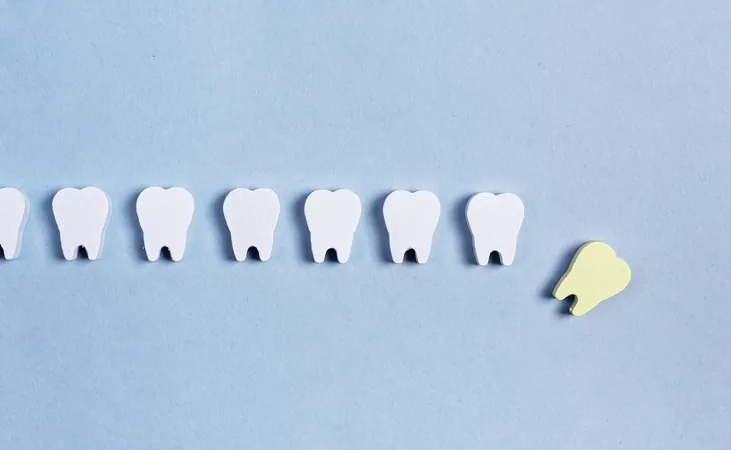
Tooth Loss Linked to Increased Sleep Apnea Risk: New Findings Unveiled!
2024-11-23
Author: Arjun
Introduction
Recent research has unveiled a concerning link between tooth loss, a condition known as edentulism, and a heightened risk for obstructive sleep apnea (OSA). A systematic review published in the Journal of Prosthodontics has found a unanimous consensus among experts regarding this association, highlighting the far-reaching implications of missing teeth on our overall health.
Health Implications of OSA
Untreated OSA can lead to severe health complications, including hypertension, diabetes, and cognitive decline. A 2022 study revealed that many individuals suffering from OSA remain undiagnosed due to a lack of coordinated care and misconceptions about the severity of their symptoms. Alarmingly, patients often believe their sleep-related issues are not significant enough to require medical attention.
The Role of Dental Health in OSA
While most sleep disorders fall under the domain of medical professionals, dental health plays an important role too, especially regarding OSA. “Oral care may be influenced by OSA,” the study authors stated, mentioning previous research that links OSA to increased instances of periodontal disease, tooth wear, and orofacial pain.
Effects of Edentulism on Airway Anatomy
The ongoing research on edentulism has primarily focused on how the anatomical changes caused by tooth loss can impact the upper airway, vital for breathing during sleep. Edentulism can lead to a reduction in vertical dimension of occlusion, mandibular rotation, and a smaller lower face height, ultimately causing the airway to collapse more easily—a risk factor for developing OSA.
Research Findings
To explore the connection between edentulism and OSA, researchers sifted through numerous scientific publications from 1999 to 2023. They identified 23 clinical studies, including six randomized controlled trials, all of which confirmed a link between the two conditions. Notably, individuals with edentulism exhibited Apnea-Hypopnea Index scores that were 2 to 3 times higher than those with natural teeth. However, the authors highlighted a significant gap in direct comparisons between dentulous and edentulous patients, urging the need for further research in this area.
Impact of Dentures on OSA Risk
An intriguing aspect of the study discusses the influence of dentures on the risk of OSA. Current research provides conflicting evidence—while some studies indicate that wearing dentures may increase OSA risks, others suggest that they could reduce it. A recent examination of implant-supported mandibular dentures revealed promising results, as these dentures appeared to enhance airway space and alleviate symptoms for those with mild to moderate OSA.
Conclusion and Future Directions
The authors assert that the potential association between edentulism and OSA emphasizes the critical need for effective prosthodontic management and preventive strategies against tooth loss. However, they caution that the current clinical data is limited and varied, necessitating additional studies to solidify these findings.
Call to Action
This emerging evidence should not be taken lightly. For those dealing with oral health issues, it supports the notion that maintaining dental health is crucial not only for a bright smile but also for safeguarding against life-threatening conditions like sleep apnea. Stay tuned as researchers continue to uncover the intricate relationships between dental health and overall well-being!


 Brasil (PT)
Brasil (PT)
 Canada (EN)
Canada (EN)
 Chile (ES)
Chile (ES)
 España (ES)
España (ES)
 France (FR)
France (FR)
 Hong Kong (EN)
Hong Kong (EN)
 Italia (IT)
Italia (IT)
 日本 (JA)
日本 (JA)
 Magyarország (HU)
Magyarország (HU)
 Norge (NO)
Norge (NO)
 Polska (PL)
Polska (PL)
 Schweiz (DE)
Schweiz (DE)
 Singapore (EN)
Singapore (EN)
 Sverige (SV)
Sverige (SV)
 Suomi (FI)
Suomi (FI)
 Türkiye (TR)
Türkiye (TR)